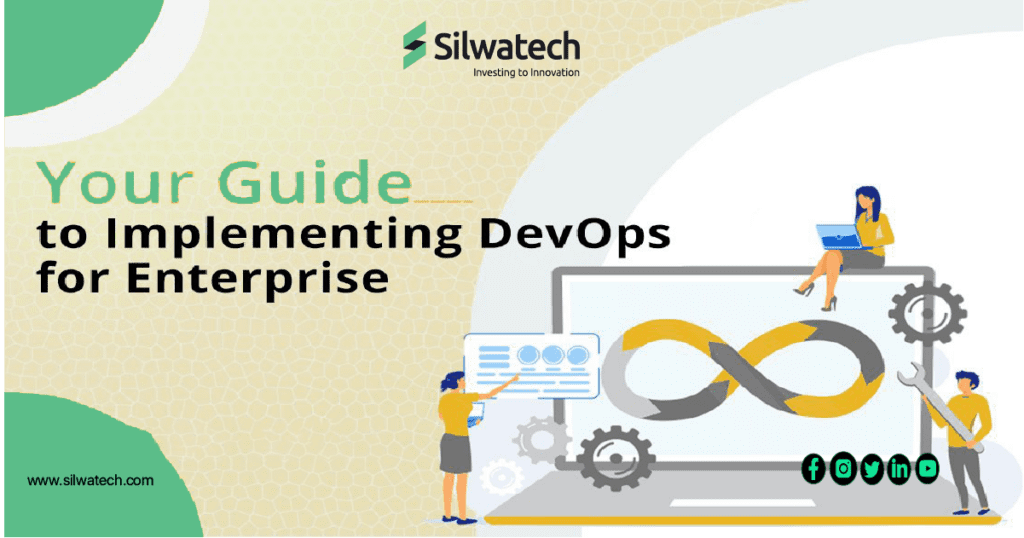Businesses steeped in IT operations and culture increasingly adopt DevOps to become lean and successful. Automation technologies have evolved across various industry verticals, strengthening the demand for DevOps tools. Software upgrades are becoming more important in a digitally empowered landscape. And enterprises are quick to adopt DevOps solutions for quick development and deployment.
According to research by Global Market Insights, this trend is predicted to be a mainstay in the industry. The industry’s future shows a CAGR of over 20% between 2020 and 2026. Businesses that understand the advantages of DevOps adopt it to get its benefits like faster release cycle, greater scalability, greater collaboration, and much more. Let us take a look at the process of implementing DevOps for enterprises.
What is DevOps for Enterprises?
Standard DevOps methodology focuses on automating the CI/CD pipeline. Every requirement is analyzed in detail, and each automation task’s meaning is provided. When it comes to Enterprise DevOps or DevOps for enterprises, it becomes about doing things at a larger scale, focusing on creating reliability and availability.
Enterprise DevOps also differs from standard DevOps in how it practices security. DevOps for enterprises follow the standard practices for DevSecOps. Security and privacy of private information are paramount in enterprise-level organizations as they must comply with regulatory standards.
Large-scale organizations implement DevOps when they face difficulty maintaining static software or a monolithic system. If the organization deals with manual and error-prone workflows and many interdependent and related subsystems. If your organization is dealing with security, medical, or financial issues or is following the waterfall model-based processes among different teams.
The DevOps Implementation Roadmap
1. Introduce DevOps Initiative:
The CIO introduces the DevOps initiative as part of the IT activities of the company. The required human resources and investment are also facilitated. The program manager designs a DevOps strategy and monitors the implementation while changes are made to the development and operations activities.
2. Develop DevOps Strategy:
A DevOps strategy should enhance team collaboration, better infrastructure provisioning, software development, and testing. The Infrastructure-as-code mechanism, automated testing, integration, deployment, and release process are implemented in a shared environment with common teams and common goals.
3. Use Containerization:
Individual parts of the software can run independently of the infrastructure, adding to their ability to run on any environment without dependencies. Containerization is thus implemented to ensure software reliability while moving between processes.
4. CI/CD Tools are integrated into the Infrastructure:
Automation tools like Kubernetes, Chef, and Ansible, and CI/CD tools like Bamboo, Jenkins, and GoCD are integrated into the infrastructure. It enables configuration management concerns and effective deployment. They also prepare containers for risk tolerance.
5. More Test Automation and QA-Dev Alignment:
Test automation is a must for faster delivery cycles, although functional testing can be manual. To address post-release issues, the QA has to be Dev aligned.
6. Application Performance Monitoring:
Application defects can be detected with application performance monitoring and then prioritized and isolated. Application server and UX monitoring activities reveal these issues.
Strategies for Implementing Enterprise DevOps
Effective implementation of DevOps means having a strong strategy in place. This would mean adopting agile methodologies as well. Here is a strategy to implement DevOps for enterprise at your organization.
- Testing the waters with a small group: You can implement DevOps in your enterprise within a small group. If the results are good enough, then you can scale up and apply them to other groups.
- Building a common infrastructure with the right tools: Implementing DevOps requires adequate integrations. Tools that are compatible with your infrastructure can help you build a strong infrastructure with customized processes.
- Communication is Key: Communication and cooperation between the different departments give the best result. Bridging the gap between these teams by resolving underlying communications issues creates an environment for the development team to speed up their processes.
- Pivot Integration: Companies with teams reliant on legacy software should integrate processes and software tools to coordinate activities across teams. This ensures data is available to all employees.
- Flexible roles for team members: Team members across different departments should be able to communicate and have the knowledge to work together across functional boundaries.
- Security is a priority: Agile teams must follow security protocols when working in phased software development environments. The password and access token for apps, containers, and microservices are the same for everyone working on the team. There may be security bottlenecks during the DevOps transformation if asset and data security are not managed properly.
Challenges to DevOps Adoption
Like any other change, implementing DevOps can be a challenge too. It is a change that affects every process in the enterprise. However, you can be ready with proper awareness of the common challenges that organizations face with DevOps implementation.
- Poor Supervision of Processes: Many new features are part of DevOps, like automation, which reduces the product deployment time. But how these features are used is very important. There can be adverse effects without proper supervision, and your product may be of poor quality.
- Lack of proper implementation: To implement DevOps technologies, you must first grasp the core principles behind DevOps. Both of them go hand in hand. Using DevOps tech without first grasping the idea can be disastrous for your company.
- Shifting from Legacy Infrastructure to Microservices: Legacy technology is one of the mistakes a company can make while trying to shift to DevOps methodology. It limits what your team can do and puts you at a disadvantage in a competitive market. Moving to microservices makes faster innovation and development possible, and it comes with its own set of challenges.
DevOps Implementation Business Benefits
There are obvious business benefits to implementing DevOps methodology in an enterprise organization. It improves issues like siloed functioning of the developer and operations teams, lack of an aligned vision and objectives across teams, and lack of understanding of domain specifics, etc. Here are some of the benefits of implementing DevOps for your business.
- Increased collaboration: DevOps increases the overall collaboration between different teams. Employees then work with transparency, feedback, and sharing of responsibility. There is room for more trust and cooperation among different teams, leading to effective collaboration.
- Better performance: Compared to previous software development project models, DevOps leads to better performance. Previously, different teams would be working on a singular piece of code. This leads to inefficient, redundant, and decreased software performance. With DevOps, there is a focus on frequent releases. This cuts down the rework time and chances of errors and reduces the time taken for system recovery. There is also a faster time-to-market potential.
- Better client experience: Ultimately, the DevOps model has a faster time-to-market model. Along with this, client preferences and market conditions are taken into account. Thus the faster software development process leads to better products and a more satisfied customer.
- Cutting Expenses: Since both maintenance and new updates are combined into one area for consideration, the DevOps deployment strategy aids in minimizing the production costs of your departments.
Summing Up
Enterprise DevOps is a must-have in every software development company. Its effectiveness in aiding companies to improve procedures, technologies, tools, and capabilities makes it a sought-after methodology. It may seem complicated, but with a good guide and attention to detail, you can implement it correctly. Implementing DevOps may be the best thing for your enterprise.
Why Hire Silwatech for DevOps Development Services
Starting from scratch and doing it all on your own can be the next-to-impossible task. It is impractical to try and do it on your own. The wiser option would be to outsource it to a DevOps development company that provides DevOps consulting and DevOps development services. Since this is a critical business decision, you must hire only from top DevOps consulting companies. That is where professionals like Silwatech come in.
At Silwatech, we provide IT infrastructure development that can adapt to the scale and speed of your business growth and IT operations. We help companies bridge the gap between the operations and development teams, accelerating your product development.
As a reputed DevOps consultant in Dubai, we provide infra-development services that you can rely on. To learn more about our DevOps services, please reach out to us. Our team will be more than happy to help you.




















